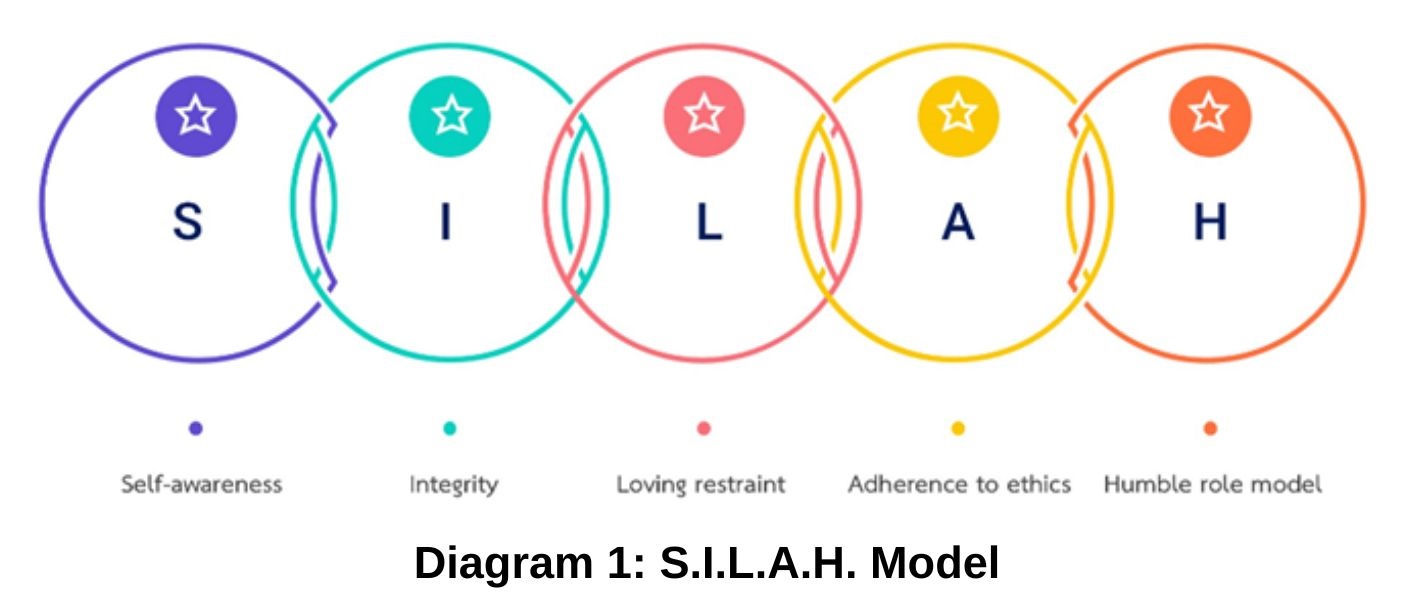Leadership Development through the Practice of Sila Parami
Keywords:
Development, Leadership, Leadership Development, Sila ParamiAbstract
This qualitative research article aims to analyze and develop a framework for ethical leadership development grounded in Sila Parami (the perfection of moral discipline) in Theravada Buddhist philosophy. The study has three main objectives: (1) to explore the concept and meaning of Sila Parami through a metaphysical and ethical lens, (2) to examine its relationship with the desired characteristics of contemporary leadership, and (3) to propose a conceptual model for leadership development based on Sila Parami. Methodologies employed include philosophical analysis, documentary research.
The findings indicate that Sila Parami is not merely a moral prohibition but a deep ethical structure fostering self-awareness, self-regulation, integrity, inner stability, and exemplary leadership. The study proposes the “S.I.L.A.H. Model” as a practical and conceptual guide for cultivating ethical leadership. The model includes five components: Self-awareness, Integrity, Loving restraint, Adherence to ethics, and Humble role model. It can be applied in individual development, organizational leadership training, and public policy design. Recommendations highlight the need for leadership programs based on inner cultivation, assessment tools aligned with ethical traits, and broader policy integration.
References
กาญจนา ศรีปัญญา. (2565). ผู้นำกับศีลธรรมในสังคมเปลี่ยนผ่าน : การสังเคราะห์เชิงพุทธปรัชญา. วารสารวิถีธรรมวิจัย, 17(2), 23–38.
จุฑารัตน์ แก้วแจ่ม. (2564). คุณธรรมจริยธรรมกับภาวะผู้นำในสังคมไทยปัจจุบัน. วารสารศาสตรวิทยา มหาวิทยาลัยมหาจุฬาลงกรณราชวิทยาลัย, 28(3), 144–159.
ธรรมทัศน์. (2560). เทศน์บารมีในพุทธศาสนาเถรวาท. [ออนไลน์]. แหล่งที่มา : https://dhammayut.org [18 มิถุนายน 2568].
พระพรหมคุณาภรณ์ (ป.อ. ปยุตฺโต). (2543). พุทธธรรม : ฉบับปรับขยาย. กรุงเทพฯ : มหาวิทยาลัยมหาจุฬาลงกรณราชวิทยาลัย.
พระมหาวุฒิชัย วชิรเมธี. (2557). ผู้นำยุคใหม่ในโลกแห่งการเปลี่ยนแปลง. เชียงราย: สำนักพิมพ์ DMG.
พระมหาสมชาย ฐานวุฑฺโฒ. (2561). การพัฒนาภาวะผู้นำด้วยหลักธรรมทางพระพุทธศาสนา. [ออนไลน์]. แหล่งที่มา : http://pb.mcu.ac.th [25 มิถุนายน 2568].
พระมหาหรรษา ธมฺมหาโส. (2561). จริยศาสตร์เชิงพุทธ : การตีความในสังคมร่วมสมัย. กรุงเทพฯ : มูลนิธิพุทธธรรม.
พระมหาหรรษา ธมฺมหาโส. (2562). การจัดการจริยธรรมสำหรับผู้นำทางสังคม. วารสารพุทธศาสตร์ปริทรรศน์, 17(1), 44–58.
สุพจน์ พงศ์พุฒิคุณ. (2563). การนำหลักธรรมพุทธมาใช้ในการบริหารจัดการสมัยใหม่. วารสารปริยัติธรรม, 35(1), 45–57.
Avolio, B. J., & Gardner, W. L. (2005). Authentic leadership development: Getting to the root of positive forms of leadership. The Leadership Quarterly, 16(3), 315–338. https://doi.org/10.1016/j.leaqua.2005.03.001
Bass, B. M., & Steidlmeier, P. (1999). Ethics, character, and authentic transformational leadership behavior. The Leadership Quarterly, 10(2), 181–217. https://doi.org /10.1016/S1048-9843(99)00016-8
Boyatzis, R. E. (2006). Intentional change theory from a complexity perspective. Journal of Management Development, 25(7), 607–623. https://doi.org/10.1108/02621710610678445
Brown, M. E., & Treviño, L. K. (2006). Ethical leadership: A review and future directions. The Leadership Quarterly, 17(6), 595–616. https://doi.org/10.1016/j.leaqua.2006.10.004
Gethin, R. (1998). The foundations of Buddhism. Oxford University Press.
Greenleaf, R. K. (1977). Servant leadership: A journey into the nature of legitimate power and greatness. Paulist Press.
Phuttipong, K. (2021). Leadership ethics and Buddhist precepts : A philosophical synthesis [Master’s thesis, Thammasat University]. Thammasat e-Thesis. [ออนไลน์]. แหล่งที่มา: https://ethesisarchive.library.tu.ac.th/thesis/2021/TU_2021_5906031611_15788_20600.pdf [18 มิถุนายน 2568].

Downloads
Published
How to Cite
Issue
Section
License
Copyright (c) 2025 Institute of Sufficiency Journal

This work is licensed under a Creative Commons Attribution-NonCommercial-NoDerivatives 4.0 International License.



